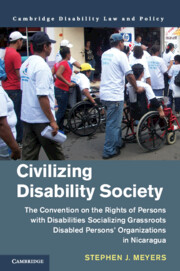 Civilizing Disability Society
Civilizing Disability Society Book contents
- Civilizing Disability Society
- Cambridge Disability Law and Policy Series
- Civilizing Disability Society
- Copyright page
- Contents
- Acknowledgments
- 1 Spending Down a Grant
- 2 Inhabiting Nicaraguan Civil Society at the Intersection
- 3 The Problem with Pretty Little Programs
- 4 Grassroots Members Walking and Rolling Away
- 5 Identity Politics as the Continuation of War by Other Means
- 6 Innovation at the Crossroads
- 7 The CRPD’s Civilizing Mission
- References
- Index
4 - Grassroots Members Walking and Rolling Away
Published online by Cambridge University Press: 27 September 2019
- Civilizing Disability Society
- Cambridge Disability Law and Policy Series
- Civilizing Disability Society
- Copyright page
- Contents
- Acknowledgments
- 1 Spending Down a Grant
- 2 Inhabiting Nicaraguan Civil Society at the Intersection
- 3 The Problem with Pretty Little Programs
- 4 Grassroots Members Walking and Rolling Away
- 5 Identity Politics as the Continuation of War by Other Means
- 6 Innovation at the Crossroads
- 7 The CRPD’s Civilizing Mission
- References
- Index
Summary
Increasingly, international human-rights movements “manufacture civil society from the outside.” In 2008, a Danish disability-rights organization came to Segovia and established the Association of the Physically and Motorly Disabled (ADIFIM), for the purposes of advocating for disability rights. That same year, Handicap International (HI) also created a new organization in Segovia, the Organization of Women with Disabilities (ODIFOM), to promote women with disabilities’ rights. In both cases, the organizations generated great enthusiasm and garnered dozens of new members. After the first few years, however, both organizations’ membership began a steep decline. Persons with disabilities who had joined ADIFIM became frustrated with its narrow focus on legal advocacy and monitoring disability-rights violations. By 2012, ADIFM took the drastic step of striking old members from their books in order to be able to reach a quorum during meetings. ODIFOM closed down altogether when their members became tired of consciousness-raising activities and decided to join women’s economic cooperatives instead. Both of these cases show the continuing power of solidaridad to shape disabled persons expectations for DPOs that make it difficult for organizations that reflect international norms to survive.
Keywords
- Type
- Chapter
- Information
- Civilizing Disability SocietyThe Convention on the Rights of Persons with Disabilities Socializing Grassroots Disabled Persons' Organizations in Nicaragua, pp. 85 - 113Publisher: Cambridge University PressPrint publication year: 2019
